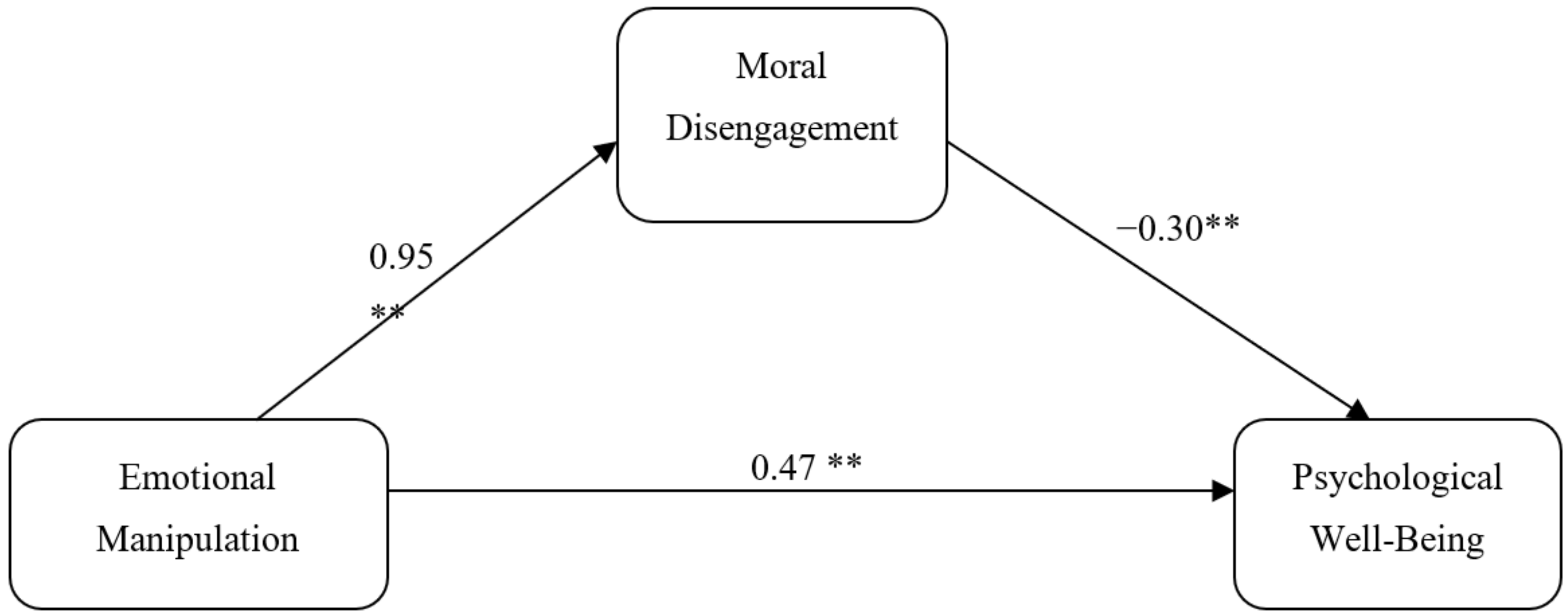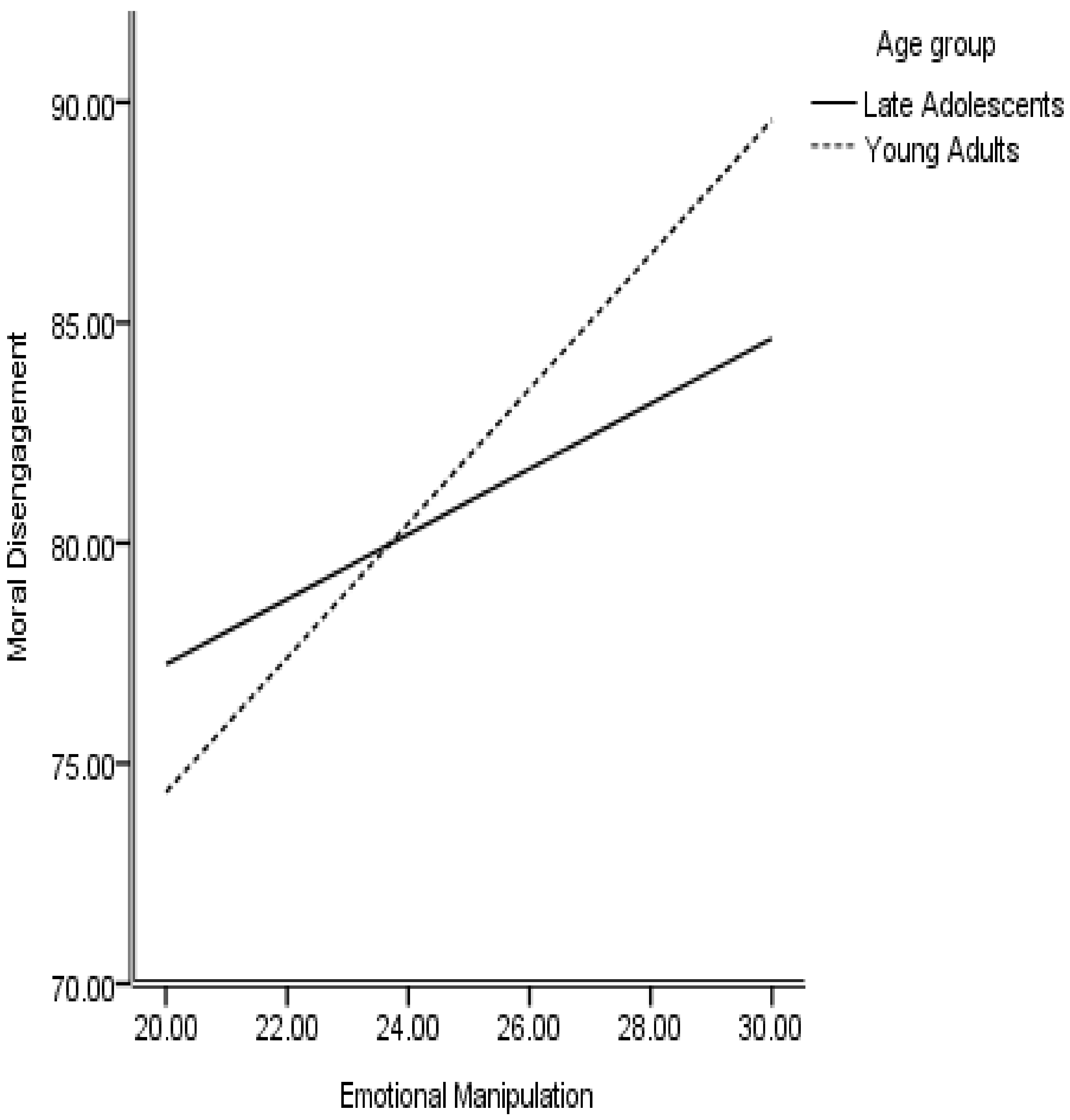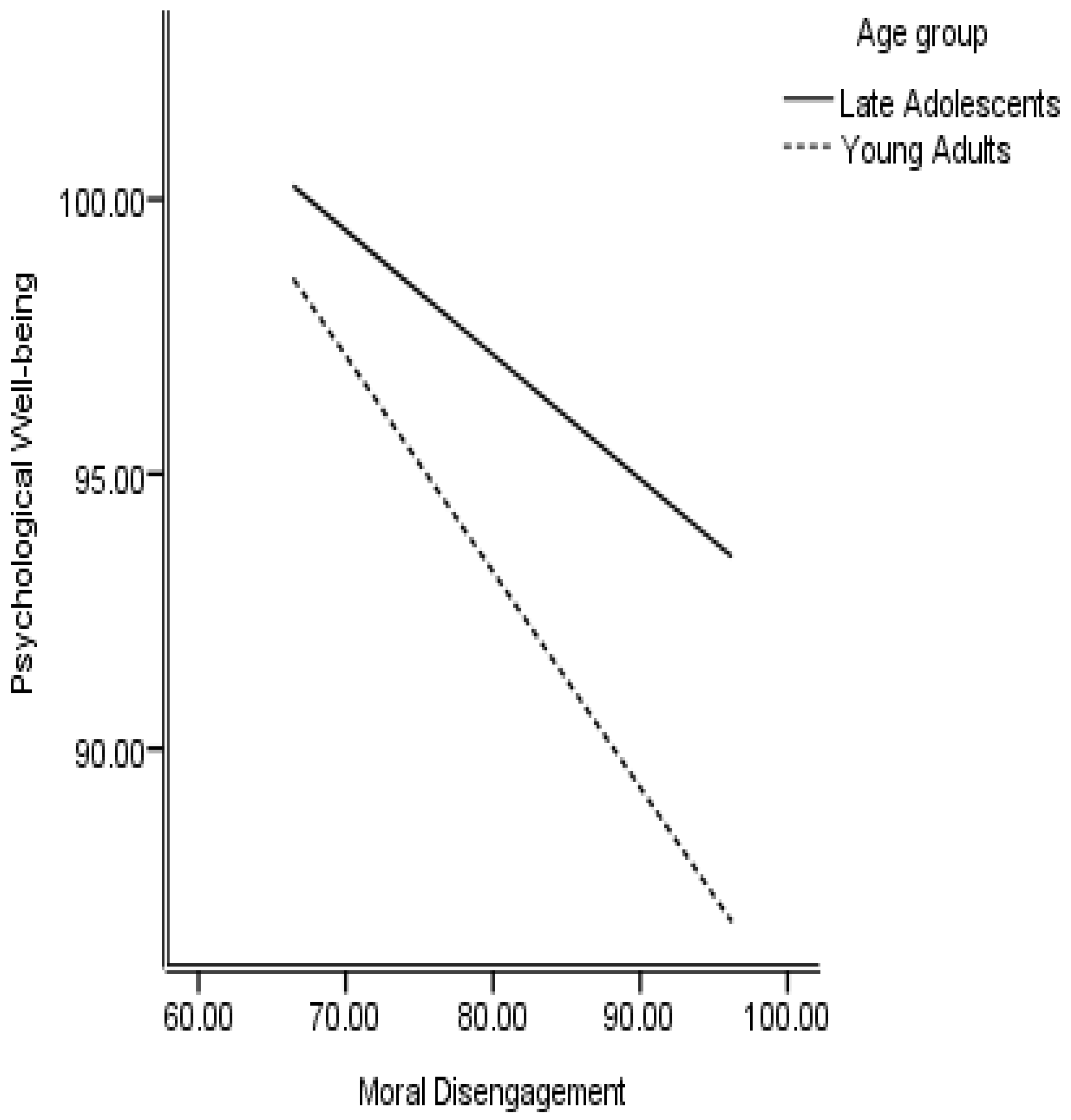Mediating Role of Moral Disengagement between Emotional Manipulation and Psychological Well-Being: Does Age Matter?
Abstract
:1. Introduction
2. Method
2.1. Participants and Procedure
2.2. Instruments
2.2.1. Emotional Manipulation Scale
2.2.2. Moral Disengagement Scale
2.2.3. Psychological Well-Being Scale
3. Results
4. Discussion
5. Conclusions
Author Contributions
Funding
Institutional Review Board Statement
Informed Consent Statement
Data Availability Statement
Acknowledgments
Conflicts of Interest
Consent For Publication
References
- Bonanno, G.A. Loss, trauma, and human resilience: Have we underestimated the human capacity to thrive after extremely aversive events? Am. Psychol. 2004, 59, 20–28. [Google Scholar] [CrossRef] [PubMed] [Green Version]
- Taylor, S.E.; Lerner, J.S.; Sherman, D.K.; Sage, R.M.; McDowell, N.K. Are self-enhancing cognitions associated with healthy or unhealthy biological profiles? J. Personal. Soc. Psychol. 2003, 85, 605–661. [Google Scholar] [CrossRef] [PubMed]
- Waterman, A.S.; Schwartz, S.J.; Zamboanga, B.L.; Ravert, R.D.; Williams, M.K.; Bede Agocha, V.; Kim, S.Y.; Donnellan, M.B. The questionnaire for eudaimonic well-being: Psychometric properties, demographic comparisons, and evidence of validity. J. Posit. Psychol. 2010, 5, 41–61. [Google Scholar] [CrossRef] [PubMed]
- Ryff, C.D.; Singer, B.H. Know thyself and become what you are: A eudaimonic approach to psychological well-being. J. Happiness Study 2008, 9, 13–39. [Google Scholar] [CrossRef]
- Ryan, R.M.; Deci, E.L. To be happy or to be self-fulfilled: A review of research on hedonic and eudaimonic well-being. Annu. Rev. Psychol. 2001, 52, 141–166. [Google Scholar] [CrossRef]
- Seligman, M.E.P.; Csikszentmihalyi, M. Positive psychology: An introduction. J. Am. Psychol. 2000, 55, 5–14. [Google Scholar] [CrossRef]
- Di Fabio, A.; Kenny, M.E. The contributions of emotional intelligence and social support to adaptive career progress among Italian youth. J. Career Dev. 2015, 42, 48–49. [Google Scholar] [CrossRef]
- Schutte, N.S.; Malouff, J.M.; Thorsteinsson, E.B.; Bhullar, N.; Rooke, S.E. A meta-analytic investigation of the relationship between emotional intelligence and health. Personal. Individ. Differ. 2007, 42, 921–933. [Google Scholar] [CrossRef]
- Martins, A.; Ramalho, N.; Morin, E. A comprehensive meta-analysis of the relationship between emotional intelligence and health. Personal. Individual. Differ. 2010, 49, 554–564. [Google Scholar] [CrossRef]
- Sanchez-Alvarez, N.; Extremera, N.; Fernández-Berrocal, P. Maintaining life satisfaction in adolescence: Affective mediators of the influence of perceived emotional intelligence on overall life satisfaction judgments in a two-year longitudinal study. Front. Psychol. 2015, 6, 1892. [Google Scholar] [CrossRef] [Green Version]
- Fernandez-Berrocal, P. Commentary: Dimensions of emotional intelligence related to physical and mental health and to health behaviors. J. Front. Psychol. 2016, 7, 441. [Google Scholar] [CrossRef] [Green Version]
- Saklofske, D.H.; Austin, E.J.; Minski, P.S. Factor structure and validity of a trait emotional intelligence measure. Personal. Individ. Differ. 2003, 34, 707–721. [Google Scholar] [CrossRef]
- Goleman, D. Working with Emotional Intelligence; Bantam Books: New York, NY, USA, 1998. [Google Scholar]
- Law, K.S.; Wong, C.S.; Song, L.J. The construct and criterion validity of emotional intelligence and its potential utility for management studies. J. Appl. Psychol. 2004, 89, 483. [Google Scholar] [CrossRef]
- Van Rooy, D.L.; Viswesvaran, C. Emotional intelligence: A meta-analytic investigation of predictive validity and nomological net. J. Vocat. Behav. 2004, 65, 71–95. [Google Scholar] [CrossRef]
- Austin, E.J.; Farrelly, D.; Black, C.; Moore, H. Emotional intelligence, Machiavellianism and emotional manipulation: Does EI have a dark side? Personal. Individ. Differ. 2007, 43, 179–189. [Google Scholar] [CrossRef]
- Andrade, E.B.; Ho, T.H. Gaming emotions in social interactions. J. Consum. Res. 2009, 36, 539–552. [Google Scholar] [CrossRef] [Green Version]
- Netzer, L.; Van Kleef, G.A.; Tamir, M. Interpersonal instrumental emotion regulation. J. Exp. Soc. Psychol. 2015, 58, 124–135. [Google Scholar] [CrossRef]
- Austin, E.J.; Saklofske, D.H.; Smith, M.; Tohver, G. Associations of the managing the emotions of others (MEOS) scale with personality, the Dark Triad and trait EI. Personal. Individ. Differ. 2014, 65, 8–13. [Google Scholar] [CrossRef] [Green Version]
- Grieve, R.; Mahar, D. The emotional manipulation–psychopathy nexus: Relationships with emotional intelligence, alexithymia and ethical position. Personal. Individ. Differ. 2010, 48, 945–950. [Google Scholar] [CrossRef] [Green Version]
- Zeidner, M.; Matthews, G.; Roberts, R.D. The emotional intelligence, health, and well-being nexus: What have we learned and what have we missed? Appl. Psychol. Health Well-Being 2012, 4, 1–30. [Google Scholar] [CrossRef]
- Slaski, M.; Cartwright, S. Emotional Intelligence Training and its Implications for Stress, Health and Performance. J. Stress Health 2002, 19, 233–239. [Google Scholar] [CrossRef]
- Mikolajczak, M.; Nelis, D.; Hansenne, M.; Quoidbach, J. If you can regulate sadness, you can probably regulate shame: Associations between trait emotional intelligence, emotion regulation and coping efficiency across discrete emotions. Personal. Individ. Differ. 2008, 44, 1356–1368. [Google Scholar] [CrossRef]
- Gallagher, E.N.; Vella-Brodrick, D.A. Social support and emotional intelligence as predictors of subjective well-being. Personal. Individ. Differ. 2008, 44, 1551–1561. [Google Scholar] [CrossRef]
- Rossen, E.; Kranzler, J.H. Incremental validity of the Mayer–Salovey–Caruso Emotional Intelligence Test Version 2.0 (MSCEIT) after controlling for personality and intelligence. J. Res. Personal. 2009, 43, 60–65. [Google Scholar] [CrossRef]
- Petrides, K.V.; Pita, R.; Kokkinaki, F. The location of trait emotional intelligence in personality factor space. Br. J. Psychol. 2007, 98, 273–289. [Google Scholar] [CrossRef] [PubMed] [Green Version]
- Lopes, P.N.; Salovey, P.; Straus, R. Emotional intelligence, personality, and perceived quality of social relationships. Personal. Individ. Differ. 2003, 35, 641–658. [Google Scholar] [CrossRef]
- Salovey, P.; Bedell, B.T.; Detweiler, J.B.; Mayer, J.D. Current directions in emotional intelligence research. In Handbook of Emotions, 2nd ed.; Lewis, M., Haviland-Jones, J.M., Eds.; Guilford Press: New York, NY, USA, 2000; pp. 504–520. [Google Scholar]
- Resurreccion, D.M.; Salguero, J.M.; Ruiz-Aranda, D. Emotional intelligence and psychological maladjustment in adolescence: A systematic review. J. Adolesc. 2014, 37, 461–472. [Google Scholar] [CrossRef]
- Raina, M.; Bakhshi, A. Emotional intelligence predicts eudaimonic well being. J. Humanit. Soc. Sci. 2013, 11, 42–47. [Google Scholar] [CrossRef]
- De Raad, B. The trait-coverage of emotional intelligence. Personal. Individ. Differ. 2005, 38, 673–687. [Google Scholar] [CrossRef]
- Glenn, A.L.; Iyer, R.; Graham, J.; Koleva, S.; Haidt, J. Are all types of morality compromised inpsychopathy? J. Personal. Disord. 2009, 23, 384–398. [Google Scholar] [CrossRef]
- Paulhus, D.L.; Williams, K.M. The Dark Triad of personality: Narcissism, Machiavellianism, and psychopathy. J. Res. Personal. 2002, 36, 556–563. [Google Scholar] [CrossRef]
- Bergman, M.E.; Langhout, R.D.; Palmieri, P.A.; Cortina, L.M.; Fitzgerald, L.F. The (un) reasonableness of reporting: Antecedents and consequences of reporting sexual harassment. J. Appl. Psychol. 2002, 87, 230. [Google Scholar] [CrossRef] [PubMed] [Green Version]
- Lazarus, R.S.; Folkman, S. Stress, Appraisal, and Coping; Springer Publishing Company: New York, NY, USA, 1984. [Google Scholar] [CrossRef]
- Fida, R.; Paciello, M.; Tramontano, C.; Fontaine, R.G.; Barbaranelli, C.; Farnese, M.L. An integrative approach to understanding counterproductive work behavior: The roles of stressors, negative emotions, and moral disengagement. J. Bus. Ethics 2015, 130, 131–144. [Google Scholar] [CrossRef] [Green Version]
- Bandura, A. Social cognitive theory of moral thought and action. In Handbook of Moral Behavior and Development: Theory, Research and Applications; Kurtines, W.M., Gewirtz, J.L., Eds.; Erlbaum: Hillsdale, NJ, USA, 1991; Volume 1, pp. 71–129. [Google Scholar]
- Bandura, A. Moral Disengagement: How People Do Harm and Live with Themselves; Worth Publishers: New York, NY, USA, 2016; p. 446. [Google Scholar]
- Perren, S.; Gutzwiller-Helfenfinger, E. Cyberbullying and traditional bullying in adolescence: Differential roles of moral disengagement, moral emotions, and moral values. Eur. J. Dev. Psychol. 2012, 9, 195–209. [Google Scholar] [CrossRef]
- Malti, T.; Gasser, L.; Gutzwiller-Helfenfinger, E. Children’s interpretive understanding, moral judgments, and emotion attributions: Relations to social behaviour. Br. J. Dev. Psychol. 2010, 28, 275–292. [Google Scholar] [CrossRef]
- Byrne, M.K. Trauma reactions in the offender. Int. J. Forensic Psychol. 2003, 1, 59–70. [Google Scholar]
- Carver, C.S.; Ganellen, R.J. Depression and Components of Self-Punitiveness: High Standards, Self-Criticism, and Overgeneralization. J. Abnorm. Psychol. 1983, 92, 330–337. [Google Scholar] [CrossRef] [PubMed]
- Grieve, R.; Panebianco, L. Assessing the role of aggression, empathy, and self-serving cognitive distortions in trait emotional manipulation. Aust. J. Psychol. 2013, 65, 79–88. [Google Scholar] [CrossRef]
- Bar-On, R. The Emotional Quotient Inventory (EQ-i): A Test of Emotional Intelligence; Multi-Health Systems, Inc.: Toronto, ON, Canada, 1997. [Google Scholar]
- Bar-On, R. The Emotional Quotient Inventory (EQ-i): Technical Manual; Multi-Health Systems, Inc.: Toronto, ON, Canada, 1997. [Google Scholar] [CrossRef] [Green Version]
- Bar-On, R.; Parker, J.D.A. The Bar-On Emotional Quotient Inventory: Youth Version (EQ-i:YV) Technical Manual; Multi-Health Systems, Inc.: Toronto, ON, Canada, 2000. [Google Scholar]
- Kaufman, D. ABC of learning and teaching in medicine: Applying educational theory in practice. BMJ Clin. Res. 2003, 326, 213–216. [Google Scholar] [CrossRef]
- Hausknecht, J.P.; Halpert, J.A.; Di Paolo, N.T.; Moriarty Gerrard, M.O. Retesting in selection: A meta-analysis of coaching and practice effects for tests of cognitive ability. J. Appl. Psychol. 2007, 92, 373. [Google Scholar] [CrossRef]
- Blanchard-Fields, F. Everyday problem solving emotion: An adult developmental perspective. Curr. Dir. Psychol. Sci. 2007, 16, 26–31. [Google Scholar] [CrossRef]
- Gross, J.J.; John, O.P. Individual differences in two emotion regulation processes: Implications for affect, relationships, and well-being. J. Personal. Soc. Psychol. 2003, 85, 348–362. [Google Scholar] [CrossRef]
- John, O.P.; Gross, J.J. Healthy and unhealthy emotion regulation: Personality processes, individual differences, and life span development. J. Personal. 2004, 72, 1301–1333. [Google Scholar] [CrossRef] [PubMed]
- Paciello, M.; Fida, R.; Tramontano, C.; Lupinetti, C.; Caprara, G.V. Stability and change of moral disengagement and its impact on aggression and violence in late adolescence. Child Dev. 2008, 79, 1288–1309. [Google Scholar] [CrossRef] [PubMed]
- Eisenberg, N.; Cumberland, A.; Guthrie, I.K.; Murphy, B.C.; Shepard, S.A. Age changes in prosocial responding and moral reasoning in adolescence and early adulthood. J. Res. Adolesc. 2005, 15, 235–260. [Google Scholar] [CrossRef]
- Abell, L.; Brewer, G.; Qualter, P.; Austin, E. Machiavellianism, emotional manipulation, and friendship functions in women’s friendships. Personal. Individ. Differ. 2016, 88, 108–113. [Google Scholar] [CrossRef] [Green Version]
- Bandura, A.; Barbaranelli, C.; Caprara, G.V.; Pastorelli, C. Mechanisms of moral disengagement in the exercise of moral agency. J. Personal. Soc. Psychol. 1996, 71, 364. [Google Scholar] [CrossRef]
- Hyde, J.; Grieve, R.; Norris, K.; Kemp, N. The dark side of emotional intelligence: The role of gender and the Dark Triad in emotional manipulation at work. Aust. J. Psychol. 2020, 72, 307–317. [Google Scholar] [CrossRef]
- Pelton, J.; Gound, M.; Forehand, R.; Brody, G. The moral disengagement scale: Extension with an American minority sample. J. Psychopathol. Behav. Assess. 2004, 26, 31–39. [Google Scholar] [CrossRef]
- Ryff, C.D. Happiness is everything, or is it? Explorations on the meaning of psychological well-being. J. Personal. Pocial Psychol. 1989, 57, 1069. [Google Scholar] [CrossRef]
- Fattahi, M. A Study on Ryff’s PWB Scale in University Students. Bachelor’s Thesis, Islamic Azad University, Tehran Central Branch, Tehran, Iran, 2016. [Google Scholar]
- Shahidi, M.; French, F.; Shojaee, M.; Zanin, G.B. Predicting Students’ Psychological Well-Being through Different Types of Loneliness. Int. J. Clin. Psychiatry 2019, 7, 8–17. [Google Scholar] [CrossRef]
- Sharma, A.; Sharma, R. Internet addiction and psychological well-being among college students: A cross-sectional study from Central India. J. Fam. Med. Prim. Care 2018, 7, 147. [Google Scholar] [CrossRef]
- Giacalone, R.A.; Promislo, M.D. Unethical and unwell: Decrements in well-being and unethical activity at work. J. Bus. Ethics 2010, 91, 275–297. [Google Scholar] [CrossRef]
- Agervold, M.; Mikkelsen, E.G. Relationships between bullying, psychosocial work environment and individual stress reactions. J. Work Stress 2004, 18, 336–351. [Google Scholar] [CrossRef]
- Mikkelsen, E.G.; Einarsen, S. Bullying in Danish Work-Life: Prevalence and Health Correlates. Eur. J. Work Organ. Psychol. 2001, 10, 393–413. [Google Scholar] [CrossRef]
- Quine, L. Workplace Bullying in NHS Community Trust: Staff Questionnaire Survey. Br. Med J. 1999, 318, 228–232. [Google Scholar] [CrossRef] [PubMed] [Green Version]
- Zapf, D. Organizational, Work Group Related and Personal Causes of Mobbing/Bullying at Work. Int. J. Manpow. 1999, 20, 70–85. [Google Scholar] [CrossRef]
- Clemente, M.; Espinosa, P.; Padilla, D. Moral disengagement and willingness to behave unethically against ex-partner in a child custody dispute. PLoS ONE 2019, 14, e0213662. [Google Scholar] [CrossRef]
- Wang, X.; Lei, L.; Liu, D.; Hu, H. Moderating effects of moral reasoning and gender on the relation between moral disengagement and cyberbullying in adolescents. Personal. Individ. Differ. 2016, 98, 244–249. [Google Scholar] [CrossRef]
- Obermann, M.L. Moral disengagement among bystanders to school bullying. J. Sch. Violence 2011, 10, 239–257. [Google Scholar] [CrossRef]
- Obermann, M.L. Moral disengagement in self-reported and peer-nominated school bullying. Aggress. Behav. 2011, 37, 133–144. [Google Scholar] [CrossRef]
- Yadava, A.; Sharma, N.R.; Gandhi, A. Aggression and Moral disengagement. J. Personal. Clin. Stud. 2001, 17, 95–99. [Google Scholar]
- Niedl, K. Mobbing and well-being: Economic and personnel development implications. Eur. J. Work Organ. Psychol. 1996, 5, 239–249. [Google Scholar] [CrossRef]
- Landrine, H.; Klonoff, E.A. The schedule of racist events: A measure of racial discrimination and a study of its negative physical and mental health consequences. J. Black Psychol. 1996, 22, 144–168. [Google Scholar] [CrossRef]
- Tesser, A. Self-Evaluation. In Handbook of Self and Identity; Leary, M.R., Tangney, J.P., Eds.; Guilford Press: New York, NY, USA, 2003; pp. 275–290. [Google Scholar]
- Blanchard-Fields, F.; Chen, Y.; Norris, L. Everyday problem solving across the adult life span: Influence of domain specificity and cognitive appraisal. Psychol. Aging 1997, 12, 684–693. [Google Scholar] [CrossRef] [PubMed]
- Evans, C.; Ehlers, A.; Mezey, G.; Clark, D.M. Intrusive Memories in Perpetrators of Violent Crime: Emotions and Cognitions. J. Consult. Clin. Psychol. 2007, 75, 134–144. [Google Scholar] [CrossRef] [PubMed]



| S. no | M | SD | 1 | 2 | 3 | 4 | 5 | |
|---|---|---|---|---|---|---|---|---|
| 1 | Gender | - | 0.02 | −0.17 ** | −0.15 ** | 0.17 ** | ||
| 2 | Age | 17.33 | 0.54 | −0.16 * | - | −0.06 | 0.03 | −0.18 ** |
| 3 | Emotional Manipulation | 25.24 | 5.52 | −0.07 | 0.12 | - | 0.28 ** | 0.10 |
| 4 | Moral Disengagement | 80.95 | 14.12 | −0.18 * | 0.20 ** | 0.41 ** | - | −0.16 ** |
| 5 | Psychological well-being | 96.89 | 15.52 | 0.17 * | −0.21 ** | −0.03 | −0.42 ** | - |
| M | 20.97 | 25.22 | 82.26 | 92.43 | ||||
| SD | 1.9 | 4.66 | 16.79 | 13.43 |
| Gender | |||||||||
|---|---|---|---|---|---|---|---|---|---|
| Male (n = 250) | Female (n = 290) | 95% CI | |||||||
| Variables | M | SD | M | SD | t | p | LL | UL | Cohen’s d |
| EM | 25.86 | 5.09 | 24.68 | 5.16 | 3.19 | 0.000 | 0.55 | 2.31 | 0.23 |
| MD | 84.15 | 14.08 | 79.34 | 15.63 | 3.72 | 0.000 | 2.27 | 7.35 | 0.32 |
| PWB | 92.39 | 14.39 | 97.68 | 15.15 | 4.07 | 0.000 | −7.71 | −2.69 | 0.35 |
| 95% CL | ||||
|---|---|---|---|---|
| Conditions | B | p | LL | UL |
| EM------> MD | 0.95 | 0.000 | 0.71 | 1.18 |
| EM------> PWB | 0.47 | 0.000 | 0.22 | 0.72 |
| MD ------> PWB | −0.30 | 0.000 | −0.39 | −0.22 |
| EM ----->MD----->PWB | −0.24 | −0.41 | −0.19 | |
| R2 | 0.09 | |||
| F | 25.35 | 0.000 | ||
| Predictors | Moderator Levels | Mediator | Psychological Well-Being | |||
|---|---|---|---|---|---|---|
| MD | B | 95% CI | ||||
| B | p | LL | UL | |||
| Emotional manipulation | 1.01 | 0.000 | 0.49 | 0.23 | 0.74 | |
| Moral Disengagement | −0.28 | −0.37 | −0.20 | |||
| Age | 1.22 | 0.34 | −4.21 | −6.74 | −1.67 | |
| Emotional manipulation*Age | 0.79 | 0.003 | 0.12 | −0.46 | 0.69 | |
| Late Adolescents | 0.45 | 0.16 | 0.73 | |||
| Young Adults | 0.56 | 0.06 | 1.06 | |||
| Moral Disengagement*Age | −0.17 | −0.34 | 0.01 | |||
| Late Adolescents | −0.17 | −0.29 | −0.08 | |||
| Young Adults | −0.60 | −0.91 | −0.38 | |||
Publisher’s Note: MDPI stays neutral with regard to jurisdictional claims in published maps and institutional affiliations. |
© 2021 by the authors. Licensee MDPI, Basel, Switzerland. This article is an open access article distributed under the terms and conditions of the Creative Commons Attribution (CC BY) license (https://creativecommons.org/licenses/by/4.0/).
Share and Cite
Aftab, S.R.; Malik, J.A. Mediating Role of Moral Disengagement between Emotional Manipulation and Psychological Well-Being: Does Age Matter? Behav. Sci. 2021, 11, 117. https://doi.org/10.3390/bs11090117
Aftab SR, Malik JA. Mediating Role of Moral Disengagement between Emotional Manipulation and Psychological Well-Being: Does Age Matter? Behavioral Sciences. 2021; 11(9):117. https://doi.org/10.3390/bs11090117
Chicago/Turabian StyleAftab, Syeda Rubab, and Jamil Ahmad Malik. 2021. "Mediating Role of Moral Disengagement between Emotional Manipulation and Psychological Well-Being: Does Age Matter?" Behavioral Sciences 11, no. 9: 117. https://doi.org/10.3390/bs11090117
APA StyleAftab, S. R., & Malik, J. A. (2021). Mediating Role of Moral Disengagement between Emotional Manipulation and Psychological Well-Being: Does Age Matter? Behavioral Sciences, 11(9), 117. https://doi.org/10.3390/bs11090117






